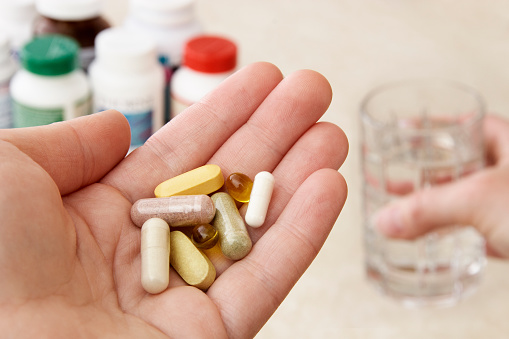Vitamins and minerals belong to a very important category of molecules known as essential nutrients. These are compounds your body needs to survive and thrive, but cannot produce enough of on its own, so it must consume them instead. While there are dozens of vital vitamins and minerals, these are some of the most important, so be sure you’re adding sources of them to your diet on a routine basis.
1. Calcium
This nutrient is often synonymous with bone and teeth health, and for good reason. It helps build and strengthen these structures so they’re well protected from potential damage. However, calcium has several other important functions, like regulating muscle relaxation and contraction. This includes your voluntary muscles, like the ones that help you move your arms and legs, and your involuntary ones, including your heart. Dairy products are an excellent source of calcium, along with broccoli, beans, and nuts. Nearly half the US population does not consume enough calcium, so taking vitamin and mineral supplements can help.
2. Vitamin D
Another important nutrient for bone health, vitamin D helps your body better absorb and process calcium. You can find it in egg yolks and some fatty fish, but one of the best ways to give your body what it needs is to absorb it from sunlight. 15 minutes a day is recommended, but be careful to prevent overexposure to UVA rays by setting time limits. Apply sunscreen if conditions are harsh or if you’re outdoors for extended periods of time.
3. Iron
Iron performs plenty of vital functions, from maintaining adequate energy levels to supporting healthy red blood cells. You can find good amounts in beef, shellfish, spinach, and organ meats. Women tend to need more iron than men when they’re pregnant or menstruate on a monthly basis. Vegetarians or those who do not eat red meat may also need to add more iron to their diet. Take care though; too much of this nutrient can lead to nausea and other digestive issues.
4. Vitamin B-12
Another energy powerhouse is vitamin B-12. This nutrient is actually a complex of water-soluble vitamins that support energy production, DNA production, and cell health. Much like iron, the best sources are animal products, such as beef and liver, although you can sometimes find it in certain fortified foods. It’s a good idea to add this to your list of important supplements to support more well-rounded nutrition, especially if you are a vegetarian or vegan.
5. Magnesium
Magnesium helps your body produce and utilize protein. It can also play an important role in supporting healthy glucose and stress levels while maintaining proper vasodilation in your cardiovascular system. There are plenty of nutritious foods that are high in magnesium, including:
- Artichoke
- Tofu
- Brown rice
- Beans
- Brazil nuts
- Pumpkin
Try adding these to your diet to help increase your magnesium consumption.
6. Folate
Sometimes referred to as folic acid, folate is absolutely essential for expectant mothers, as it helps protect the growing fetus. However, it’s important for all human beings and helps with supporting a healthy mood balance, a robust integumentary system, and keeping inflammatory responses under control. Dark leafy greens, such as spinach and kale, are excellent sources of folate, along with other important nutrients, making them a superfood that everyone should add to their diets. Try blending them up in a smoothie for a simple way to get a good dose of folate.
7. Zinc
If you want to maintain a healthy immune system, make sure you’re getting enough zinc in your diet. It also helps the body heal wounds at the appropriate pace. Your body can’t store zinc and save it for later; you have to consume it on a daily basis to reap the benefits. Oysters, wheat germ, spinach, sardines, and organ meats are all excellent sources.
Consuming sufficient vitamins and minerals is a critical step in maintaining proper health. Talk with your doctor to find out which options can help you support a strong, resilient body and a better quality of life.

